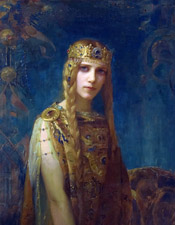Tristan and Isolde
, translated by Dyer, Abigail (dyerabigail@gmail.com)
Tristan und Isolde, composed by Richard Wagner, is a Romantic opera in three acts, inspired by medieval legends, particularly the 12th-century tales of Tristan and Iseult. Wagner's work premiered in Munich on June 10, 1865, conducted by Hans von Bülow.
The opera tells the story of the knight Tristan, who is tasked with escorting the Irish princess Isolde to Cornwall, where she is to wed his uncle, King Marke. Isolde harbours deep resentment towards Tristan, who is responsible for the death of her former betrothed. Consumed by anger and despair, Isolde resolves to poison them both, but her maid, Brangäne, substitutes the draught with a love potion. This ignites an irresistible passion between Tristan and Isolde, binding them together with a love that defies social and moral constraints.
During a clandestine meeting in the opera's second act, the pair confess their mutual desire by way of a duet. This exchange is interrupted when they are discovered by King Marke, resulting in a confrontation and Tristan's fatal wounding. In the final act, Tristan is taken to his ancestral home in Brittany, where he lies on his death bed, yearning for Isolde. When she finally arrives, Tristan dies in her arms, and Isolde, overwhelmed by grief, envisions their reunion in death through the Liebestod - immortalising their love outside of the constraints of mortal existence.
Wagner’s libretto explores the psychological and emotional aspects of the lovers’ relationship. The opera is influenced by the philosophy of Arthur Schopenhauer, particularly his ideas on the "will" and the renunciation of desires. This philosophical underpinning is mirrored in Wagner's complex harmonic structures and innovative suse of chromaticism, most famously exemplified by the “Tristan chord”. These musical innovations were pivotal role in the evolution of Western music, predicating the dissolution of traditional tonality.
Upon its premiere, Tristan und Isolde received mixed reactions due to its departure from conventional operatic forms. It has, however, since become a cornerstone of the operatic repertoire, celebrated for its influence on both music and philosophical thought.

Dyer, Abigail
Support Open-Access:
Your contribution keeps our classical translations available to all. Every dollar helps support classics education and funds the expansion of our catalogue. Value what we do? Donate now.
File Downloads:
© Copyright, All Rights Reserved. This work may be freely reproduced, stored and transmitted, electronically or otherwise, for any non-commercial purpose. Conditions and Exceptions apply.